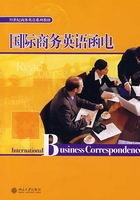
Section I Introduction
Offers and counter-offers are the middle two steps of business negotiations. Understanding the relative concepts relating to them is quite essential to making proper offers and counter-offers.
1.Definitions of Offers and Counter-offers
Offers and counter-offers are two directions of a transaction. The person making the offer is called the offeror. The person to whom the offer is made is called the offeree. A counter-offer is an offer made in respond to a previous offer by the other party during the negotiation for a final contract. It is in fact a rejection of the offer.
(1)Quotations and Offers
An offer, also known as a quotation, is a most important step in negotiating an export transaction, which is simply a reply to an enquiry usually made by the seller, giving relative information about the goods. In Chinese, quotations and offers enjoy the same version, but they are not completely the same in English. A quotation is merely a notice of certain goods at which the seller is willing to sell. That is, it only involves in the price terms of the goods being transacted, while an offer is more complicated. In addition to price terms, sellers will give buyers more information about the goods such as payment terms and shipment etc.. In practice, the two words are not so clearly distinguished.
(2)Bid
Sometimes, an offer is not made by a seller in response to a buyer's requirement, but made voluntarily. In such case, an offer is named in another terminology—a bid, that is to say, sellers will bid to buyers without the latter's enquiry.
(3)Counter-offers
When a buyer rejects a quotation or other offers, he should write a counter-offer. A counter-offer is just contrary to an offer, made by a buyer to a seller expressing his disagreement on any item of the goods. Actually, a counter offer is a new offer made by a buyer, which modifies the unacceptable terms of the original offer.
2.Classifications of Offers
If an offer comprises specific and concrete business terms, such as stated price within a stated period of time, it will be regarded as an offer with engagement, that is, a firm offer. A firm offer must be subject to the following conditions:
(1)Desiring to do business;
(2)Sending out at least one specific artificial being or natural being;
(3)having certain and specific contents(including commodity, quantity and price);
(4)Being sent to an offeree within validity of the offer.
On the other hand, the offer is viewed as a non-firm offer for there is no specific period of validity, and an offeror can cancel or withdraw it at any moment.
3.Requirements for Writing
An offer usually includes the following points:
(1)an expression of thanks for the enquiry;
(2)details of trade terms according to buyer's requests;
(3)an undertaking as to date of delivery or time of shipment;
(4)the period for which the quotation is valid and
(5)an expression of hope that the quotation will be accepted.
When a buyer is not satisfied with the quotation of the offer, he should write and thank the seller for his trouble and explain the reason for the rejection. Not to do so would show a lack of courtesy.
A counter-offer usually covers the following points:
(1)Thank the offeror for his offer;
(2)Express regret of not being able to accept the offeror's offer;
(3)State the reasons for the non-acceptance;
(4)Make a counter-offer if, in the circumstances, it is appropriate;
(5)Urge the offeree to accept the counter-offer.